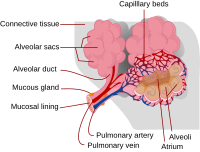
Photo from wikipedia
The severe acute respiratory syndrome coronavirus 2 that causes coronavirus disease 2019 (COVID‐19) binds to the angiotensin‐converting enzyme 2 (ACE2) to gain cellular entry. Akt inhibitor triciribine (TCBN) has demonstrated… Click to show full abstract
The severe acute respiratory syndrome coronavirus 2 that causes coronavirus disease 2019 (COVID‐19) binds to the angiotensin‐converting enzyme 2 (ACE2) to gain cellular entry. Akt inhibitor triciribine (TCBN) has demonstrated promising results in promoting recovery from advanced‐stage acute lung injury in preclinical studies. In the current study, we tested the direct effect of TCBN on ACE2 expression in human bronchial (H441) and lung alveolar (A549) epithelial cells. Treatment with TCBN resulted in the downregulation of both messenger RNA and protein levels of ACE2 in A549 cells. Since HMGB1 plays a vital role in the inflammatory response in COVID‐19, and because hyperglycemia has been linked to increased COVID‐19 infections, we determined if HMGB1 and hyperglycemia have any effect on ACE2 expression in lung epithelial cells and whether TCBN has any effect on reversing HMGB1‐ and hyperglycemia‐induced ACE2 expression. We observed increased ACE2 expression with both HMGB1 and hyperglycemia treatment in A549 as well as H441 cells, which were blunted by TCBN treatment. Our findings from this study, combined with our previous reports on the potential benefits of TCBN in the treatment of acute lung injury, generate reasonable optimism on the potential utility of TCBN in the therapeutic management of patients with COVID‐19.
Journal Title: Journal of Cellular Physiology
Year Published: 2021
Link to full text (if available)
Share on Social Media: Sign Up to like & get
recommendations!